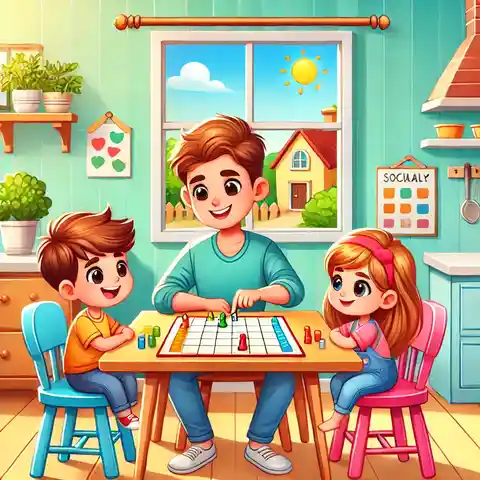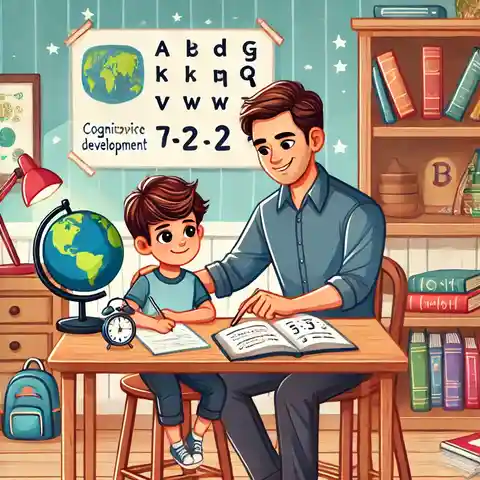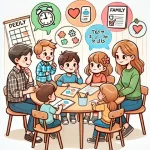Importance of parenting in child development: Parenting is crucial for growth and knowing. Parents are the first heroes of a child from his birth.
The way parents care for, teach, and interact with their children influences their physical strength, emotional health, social skills, and cognitive capacity.
Understanding the significance of parenting fosters the development of healthy, successful, and happier children.
The Importance of Parenting in Child Development

The Importance of Parenting in Child Development — Importance of Parenting is not just a Funny sitcom!
Emotional Development
Parents are responsible for their children’s emotional growth. They provide love, attention, and support, which allows children to feel safe and vital.
- Attachment: A secure relationship with their parents allows kids to experience the world safely and loved.
- Conscious Regulation: Parents model how to regulate their emotions and stress, strengthening them.
Social Development
Their parents teach them the skill of interacting with others and making friends.
- Role Models: Kids watch and learn how parents treat others (and handle life circumstances).
- Social etiquette: Parents demonstrate what is fine when behaving and interacting with others.
Cognitive Development
Parents can accomplish this by creating intellectually exciting surroundings that help children learn and think.
- Learning Activities: Read, play games, and explore to help your child think well and solve problems.
- Talking and reading: How about talking to a child? This fine build their language!
Physical Development
Parents are essential for a child’s physical health and development. They feed, walk, and keep them alive.
- Parenting Lesson: Youngsters Learn Healthy Living from Parents. Eating right, exercising, and being clean are simple life skills conveyed by responsible parents.
- Child Safety: Parents insure their children, provide a safe place for them to live, work, and play, and teach safety rules.
Moral and Ethical Development
Parents teach children the value of right and wrong.
- Category: Teaching Kids to Understand Cause (self-control)
- Values: This is the category where parents instill values in their children (such as honesty, kindness, and respect).
Auto-Reliance and Security
Good parenting makes the child independent and confident.
- Exploration: Allowing children to explore new things helps them also learn and develop a level of confidence.
- Decisiveness: When taught to choose, Our children learn to think independently.
Educational Success
Parental engagement in their child’s education impacts their learning and school effectiveness.
- Schoolwork Space: Kids concentrate better when they have a respectably calm space to do homework.
- Support and Praise: Efforts such as encouraging & praising children to achieve that make them enjoy learning.
Building Resilience
Resilience is the capacity to recover from setbacks, and parents are part of this building process in their lives.
- Coping Skills: Helps children to be stronger and teaches some ways of dealing with stress.
- Praise for Effort: Prizing your child for the effort they put in teaches them that there is a correlation between clean-up time and fun during storytime.
Developing Healthy Relationships
Parents form children as relational, well-functioning beings.
- Communication: Children learn to talk and listen by observing their parent-child relationships.
- Addressing behavior: Showing children how to settle differences amicably preserves a positive relationship.
Inspire Creativity and Imagination
Creativity Parents help kids to explore and express themselves.
- Examples of Artistic Activities: Drawing, building, and storytelling encourage creative problem-solving.
- Children Supporting Interests: Children are born with talents.
Concentrating on those areas can significantly affect parents’ children’s development and support them in developing as whole individuals.
What impact does parenting have on a child’s sociology-emotional development?

Parenting alters a kid and leads to feelings. Children feel safe and happy when they get love and care from their parents.
- Safe and Secure: Kids that feel loved are safe in their world of self.
- Social-Emotional Development: Parents help kids with sadness or anger and understand what happens.
Why Children Need Social Development
This leads to social development, too, which is great because children need to learn how to be with others. It helps them understand the sharing, turn-taking, and friendship.
- Buddies & Pals: Here, the kids will learn how to “make friends and keep them by playing nicely” and talking nicely.
- Recognizing Emotions: They will understand the feelings of others and show empathy.
How does cognitive development occur in a child with a parent’s influence?
Parents assist children in thinking and learning by offering games and activities that pique their interest.
- Learning Through Play: i.e., games, books, and many questions called the Kids Learning Hub.
- Speaking: When you talk to your children and tell them ideas, they receive the information.
How much of a role do parents play in their child’s physical development?

Children need good food and a lot of exercise to grow and be healthy; parents help.
Nutrition: Parents introduce children to healthy foods.
Physical Activity: They promote outdoor play and physical exercise.
How can you ensure that your children acquire moral values as they grow up?
Parents teach kids the rules of proper conduct. They teach them good manners and truth.
- Leading by Example: Your kids pick up on the habits they see their parents follow.
- Discipline Rules: Parents tell their children that being good and following the rules is an absolute must.
Why is an independent howl for kids needed?
It allows the child to learn to do things independently and make decisions independently.
- Independence: Children feel confident doing things by themselves.
- Independence: As kids grow up, they eventually must fend for themselves.
What Role Does Parent Involvement Play in a Child’s Education Success?
Children whose parents care about their school do better.
Militant schoolwork encouragement whereby parents “benefit” from having kids who are eager to learn.
Designate a Studying Area: Having a quiet, distraction-free area in the house can help children focus.
Resilience is what, and why do you need it for child development?
They have a tolerance for discomfort — Resilience is about carrying on even when life gets tough. It teaches children to confront obstacles and keep going.
- Stress Tolerance: Resilient children manage to work through stress with a sense of calmness and optimism.
- Taking Errors: They understand that it is completely fine to make mistakes.
How do parents teach children to build healthy relationships?
- Listening and Talking: They model how to listen while speaking kindly from their heart.
- Problem Solving: Parents teach kids how to solve problems without violence.
How can parents foster creativity in their children?
- Activities to encourage creativity: drawing, building, and pretending
- Hobbies Supported: Such as Painting with your Child or Music Lessons.
Conclusion
Knowing the significance or Importance of parenting in Child development is essential to bringing up healthy and joyful children. Parents are vital in helping kids with their impulses/feelings, social life/friends, thinking, mind, and body.
Parents inspire their children to be bold, smart, and triumphant in life only by loving them and providing guidance.
A good parent and role model is a way to show it. Always be an example to learn and be loved. Engaged, nurturing parents raise strong, happy, secure, and ready children for the future.


